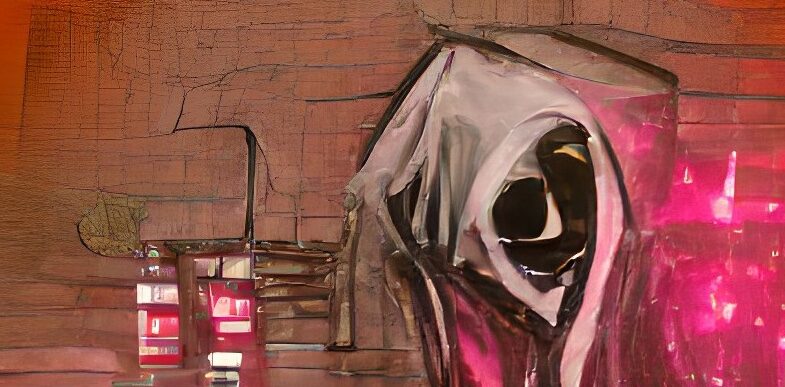To start from the beginning go here.
I decided that being on the wrong side of the interrogation table was having an overly dramatic effect on my attitude and the next blow from one of the rooks would cost them. I wanted to tell them that, the anger in me seeking some petty release, but I decided not to give them any warning. I squirmed in my seat to sit up straight, giving them the evil eye and trying to formulate a question that might make it sound like I didn’t know what this was all about.
Before I could, though, I heard the utility door behind me open and felt several new presences enter the room. I kept my eyes forward, half-expecting a slap in the back of the head. Instead, another rook stepped around the table and set down a folding chair. He thumped its legs against the floor a few times to make sure it was stable, then stepped back, retreating to the corner underneath the dead camera.
Wearing a new suit, equally dark to all of its predecessors but unwrinkled, Sartre stepped around the table. He placed his hand on the back of the chair, eyes on me, appraising me as if he were the tailor he was named after. I stared back, letting just enough of my anger show to be insubordinate.
I decided it might be suspicious not to say anything so I led with, “What’s this all about, Sartre?”
He moved to sit, as casually as a practiced hand letting go of a guillotine’s rope. He dropped the words, “Someone within my organization is talking.”
I glanced around at the rooks as if it might be one of them. Back to Sartre, I asked, “And?”
He didn’t like that. “It is on a topic very few know about.”
“Sartre, I got the living hell beat out of me finding out who killed your Ukrainian. I don’t really need any new bruises. What do you want?”
From his blazer pocket Sartre produced a casino chip and tapped in onto the edge of the table. “The police have found our Ukrainian friend.”
I glanced at the chip and then back to Sartre. “I thought that’s what you didn’t want.”
Sartre smiled, as if he were pleased I recalled that. “It is precisely what I didn’t want.”
“Sorry to hear that.” I put a weight of indifference on that statement.
“You,” the hand with the chip pointed at me, “are one of the few people who knew about this problem.”
I nodded, conceding the point. “I knew about it, but unless you left him stopping up that pipe, I wouldn’t be able to tell anybody where he was.”
“You were the one who suggested we keep the body.”
“I thought it might be useful.”
“It has been for someone.” Sartre stopped tapping the table and held the chip in his open palm, waiting for judgement. “If not you, then who might it be?”
“I dunno.” Despite the fact that I did know, I found myself twisting with a burning annoyance that it looked like I was going to hold my job as house detective indefinitely. I almost considered telling Sartre the truth so this could just end. Instead I just started throwing people under the bus. “Did Jasper know?”
“No. He knows nothing of this.”
“That makes sense.” I barely lifted my hand to point to the door behind him, indicating the casino employees, “I’d hope none of these people are stupid enough to tell the police. Someone told Mitnick. And he told the police.”
“Why do you say this?”
“It’s the only thing that makes sense. You said Mitnick put the Ukrainian in the pipe because he wanted him to be found. When he found out where you squirreled him away, he tipped off the heat.” I added a bit of American slang in the hopes Sartre would find it as pleasing as the pit bosses. Nothing makes the French feel cooler than being American.
Sartre considered this for a time, twirling the chip between fingers. “The man who I had watching the Ukrainian told me a Russian frightened him off. This is why I came to see you. I know Mitnick pays you to watch the casino.”
Sartre knew about that without me telling him, so I reminded myself that that I hadn’t seen anyone following me. I was as sure as I could be that he didn’t know about my activities for the last few days. If he did, I would probably be dead already. Holding onto that, I bet on the reply, “Sartre, I don’t know what you did with the Ukrainian. I couldn’t have told Mitnick where he was if I had wanted to.” From the back of my chair I leaned into that lie and all my previous ones with, “And I’m the one who told you Mitnick might know where the body was.” I tapped on the table in much the same way as he had with the chip. “This just means I was right.”
























